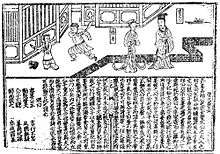Biographies of Exemplary Women
The Biographies of Exemplary Women (Chinese: 列女傳; pinyin: Liènǚ Zhuàn) is a book compiled by the Han dynasty scholar Liu Xiang c. 18 BCE. It includes 125 biographical accounts of exemplary women in ancient China, taken from early Chinese histories including Chunqiu, Zuozhuan, and the Records of the Grand Historian. The book served as a standard Confucianist textbook for the moral education of women in traditional China for two millennia.
 An 11th-century woodblock print of the book | |
| Author | Liu Xiang |
|---|---|
| Original title | 列女傳 (Liènǚ Zhuàn) |
| Country | Han dynasty China |
| Language | Classical Chinese |
| Genre | Biography |
Publication date | c. 18 BCE |
Description
The idealized biographies are divided into eight scrolls, including the eighth addendum from an unknown editor, as shown below.
| Chapter | Chinese | Translation |
|---|---|---|
| 1 | 母 儀 傳 | Matronly Models |
| 2 | 賢 明 傳 | The Worthy and Enlightened |
| 3 | 仁 智 傳 | The Benevolent and Wise |
| 4 | 貞 順 傳 | The Chaste and Obedient |
| 5 | 節 義 傳 | The Principled and Righteous |
| 6 | 辯 通 傳 | The Accomplished Speakers |
| 7 | 孽 嬖 傳 | Depraved Favorites |
| 8 | 續 列 女 傳 | Supplemental Biographies |
This book follows the lièzhuàn (列傳 "arrayed biographies") biographical format established by the Chinese historian Sima Qian. The word liènǚ (列女 "famous women in history") is sometimes understood as liènǚ (烈女 " women martyrs"), which Neo-Confucianists used to mean a "woman who commits suicide after her husband's death rather than remarry; [a] woman who dies defending her honor".
The online Chinese Text Initiative at the University of Virginia provides an e-text edition of the Lienü Zhuan, including both digitized Chinese content and images of a Song dynasty woodblock edition with illustrations by Gu Kaizhi (c. 344-405 CE) of the Jin dynasty.
Biographies included
- The mother of Mencius (孟子)
- Zheng Mao (鄭瞀)
- Consort Ban (班婕妤), (48 BCE - 6 BCE), Scholar and poet
- Empress Zhao Feiyan (趙飛燕) (c. 32 BCE – 1 BCE), empress from 16 BCE until 7 BCE
- Empress Wang (王皇后) (8 BCE – 23 CE), last empress of the Western Han
- Empress Ma (馬皇后) (40–79 CE), empress from 60 CE until her death in 79 CE
References
- Carlitz, Katherine. (1991). "The Social Uses of Female Virtue in Late Ming Editions of Lienu Zhuan." Late Imperial China 12.2: 117-48.
- Raphals, Lisa. (1998). Sharing the Light: Representations of Women and Virtue in Early China. SUNY Press.
- O'Hara, Albert Richard, tr. (1945). The position of woman in early China: according to the Lieh nu chuan, "The biographies of Chinese women". Washington, DC: Catholic University of America Press. 1955 reprint. Hong Kong: Orient Publishing Co. 1980 reprint. Westport, CT: Hyperion Press.
External links
- Lienü Zhuan, University of Virginia E-text
- Lienü Zhuan, ChinaKnowledge
- 列女傳, Chinese Text Project
- Traditions of Exemplary Women: Liu Xiang's Lienü Zhuan, Anne Behnke Kinney
- Chapter 11: Women & Men in Society, Gregory Smits, Topics in Premodern Chinese History